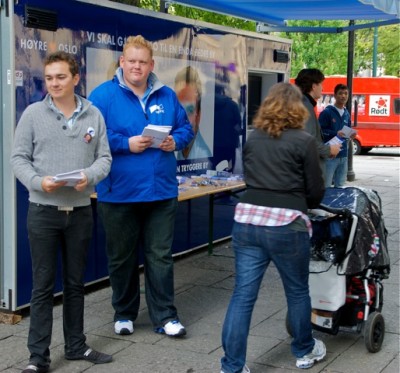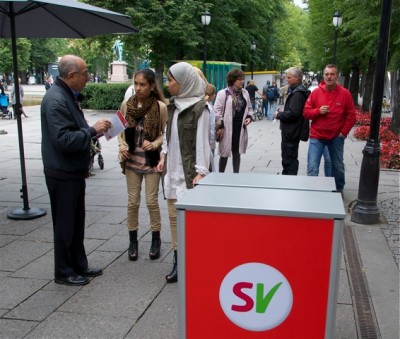Political differences have been brushed aside in Norway following last month’s terrorist attacks, but with municipal elections looming in just four weeks, the country’s various parties could delay the campaign no longer. They opened up their campaign booths over the weekend and started trying to attract voters, while Labour, the party that Norway’s homegrown terrorist wanted to hurt the most, continued to lead most public opinion polls.

It may not simply be the sympathy vote that Labour seems to be getting. Rather, Labour Prime Minister Jens Stoltenberg has been widely hailed for skillfully leading both his coalition government and his country through crisis. That’s earned his party points and praise, from even the most unlikely quarters.
Siv Jensen, head of the opposition Progress Party, was, for example, out on the campaign trail herself on Saturday and keen to win back at least some of the support her party enjoyed earlier this year. She started off her appeal to voters, though, by praising Stoltenberg, to the surprise of many.
She allowed that she and Stoltenberg disagree on most issues, “but he was my prime minister (during the crisis) too, and he deserves praise.”
That illustrated the tone of an election campaign that seems destined to rank as Norway’s most unusual ever. The bombing of government headquarters and massacre on an island outside of Oslo resulted in exactly the opposite of what terrorist Anders Behring Breivik wanted to achieve: Instead of destabilizing the government and hitting Labour hard, Norwegians and their political leaders came together in a strong show of solidarity, making political divisiveness somewhat distasteful in the face of crisis.

Commentator Håvard Narum wrote in newspaper Aftenposten last week that voters “expect politicians to conduct their campaigning in line with the cohesiveness shown over Norwegians’ common values” of openness, democracy and empathy. At the same time, though, Narum noted that voters can and should demand clarity in the differences that exist among Norway’s political parties.
The upcoming election will determine the make-up of local city and county councils for the next four years. Election Day is Monday August 12, but many local communities will also allow voting on Sunday August 11 as well as the absentee voting that’s already underway.
Major issues are at stake, since local governments in Norway play powerful roles in how public funds are spent and which projects get priority. While hospitals are state-run, everything from day care centers for children (barnehager) to nursing homes to local public transit, schools and other health care services are run through the townships (kommuner). In Oslo alone, local politicians must soon decide whether a controversial sculpture park at Ekeberg will be built, where and even whether new museums for the city’s Munch and Stenersen collections will be built, how a new city library will look and how waterfront redevelopment will proceed. Debate is unavoidable.
“We can’t stop running Oslo,” Rune Dahl, adviser to Mayor Fabian Stang told newspaper Dagsavisen. “The city must be managed and decisions must be made, that’s an important principle.”
No one, though, wants to appear as nurturing conflict so soon after a crisis. Many politicians appear keen to only promote their own programs and policies, instead of ripping apart their opponents’ programs. Some observers believe the campaign will be most dignified and respected if national party leaders play a less visible role, leaving political debate to be carried out among the local leaders who are directly involved. Indeed, national party leaders won’t meet for their first TV debate until sometime next week.
There was one immediate campaign flap, though: The conservative Progress Party’s mayoral candidate in Oslo, former high-profile party leader Carl I Hagen, refused to retract earlier statements that while he doesn’t think most Muslims are terrorists, he does think most terrorists are Muslims. Foreign Minister Jonas Gahr Støre of the Labour Party called Hagen’s attitude “grotesque,” especially after what Norway has just been through and when its own terrorist turned out to be ethnic Norwegian and a self-professed Christian.
Most agree on two things about the current election campaign: That it will be less vociferous than normal, and that voter turnout is expected to be high, as Norwegians feel united and engaged after the terrorist attacks. It was quiet around the election booths in downtown Oslo on Sunday afternoon, as campaigners for the Christian Democrats and the Liberal party passed out candy in their respective party colours – but that could also be blamed on the rain.
Views and News from Norway/Nina Berglund
Join our Readers’ Forum or comment below.
To support our news service, please click the “Donate” button now.

